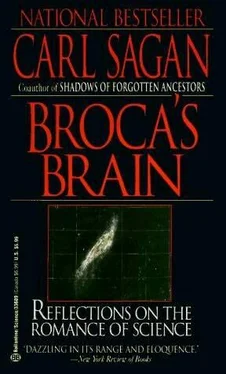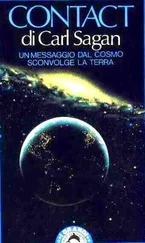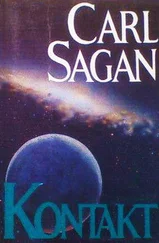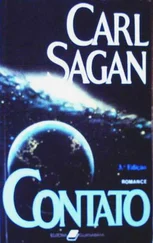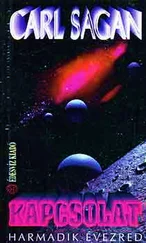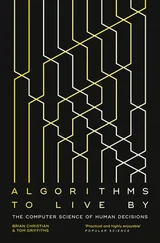Carl Sagan - Broca's Brain - The Romance of Science
Здесь есть возможность читать онлайн «Carl Sagan - Broca's Brain - The Romance of Science» весь текст электронной книги совершенно бесплатно (целиком полную версию без сокращений). В некоторых случаях можно слушать аудио, скачать через торрент в формате fb2 и присутствует краткое содержание. Жанр: Физика, на английском языке. Описание произведения, (предисловие) а так же отзывы посетителей доступны на портале библиотеки ЛибКат.
- Название:Broca's Brain: The Romance of Science
- Автор:
- Жанр:
- Год:неизвестен
- ISBN:нет данных
- Рейтинг книги:3 / 5. Голосов: 1
-
Избранное:Добавить в избранное
- Отзывы:
-
Ваша оценка:
- 60
- 1
- 2
- 3
- 4
- 5
Broca's Brain: The Romance of Science: краткое содержание, описание и аннотация
Предлагаем к чтению аннотацию, описание, краткое содержание или предисловие (зависит от того, что написал сам автор книги «Broca's Brain: The Romance of Science»). Если вы не нашли необходимую информацию о книге — напишите в комментариях, мы постараемся отыскать её.
Broca's Brain: The Romance of Science — читать онлайн бесплатно полную книгу (весь текст) целиком
Ниже представлен текст книги, разбитый по страницам. Система сохранения места последней прочитанной страницы, позволяет с удобством читать онлайн бесплатно книгу «Broca's Brain: The Romance of Science», без необходимости каждый раз заново искать на чём Вы остановились. Поставьте закладку, и сможете в любой момент перейти на страницу, на которой закончили чтение.
Интервал:
Закладка:
Moreover, there is a dangerous potential problem with the mythological material. The supposed events are reconstructed from legends and folktales. But these global catastrophes are not present in the historical records or folklore of many cultures. Such strange omissions are accounted for, when they are noted at all, by “collective amnesia.” Velikovsky wants it both ways. Where concordances exist, he is prepared to draw the most sweeping conclusions from them. Where concordances do not exist, the difficulty is dismissed by invoking “collective amnesia.” With so lax a standard of evidence, anything can be “proved.”
I should also point out that a much more plausible explanation exists for most of the events in Exodus that Velikovsky accepts, an explanation that is much more in accord with physics. The Exodus is dated in I Kings as occurring 480 years before the initiation of the construction of the Temple of Solomon. With other supporting calculations, the date for the Biblical Exodus is then computed to be about 1447 B.C. (Covey, 1975). Other Biblical scholars disagree, but this date is consistent with Velikovsky’s chronology, and is astonishingly close to the dates obtained by a variety of scientific methods for the final and colossal volcanic explosion of the island of Thera (or Santorin) which may have destroyed the Minoan civilization in Crete and had profound consequences for Egypt, less than three hundred miles to the south. The best available radiocarbon date for the event, obtained from a tree buried in volcanic ash on Thera, is 1456 B.C. with an error in the method of at least plus or minus forty-three years. The amount of volcanic dust produced is more than adequate to account for three days of darkness in daytime, and accompanying events can explain earthquakes, famine, vermin and a range of familiar Velikovskian catastrophes. It also may have produced an immense Mediterranean tsunami , or tidal wave, which Angelos Galanopoulos (1964)-who is responsible for much of the recent geological and archaeological interest in Thera-believes can account for the parting of the Red Sea as well. [9]In a certain sense, the Galanopoulos explanation of the events in Exodus is even more provocative than the Velikovsky explanation, because Galanopoulos has presented moderately convincing evidence that Thera corresponds in almost all essential details to the legendary civilization of Atlantis. If he is right, it is the destruction of Atlantis rather than the apparition of a comet that permitted the Israelites to leave Egypt.
There are many strange inconsistencies in Worlds in Collision , but on the next-to-last page of the book, a breathtaking departure from the fundamental thesis is casually introduced. We read of a hoary and erroneous analogy between the structures of solar systems and of atoms. Suddenly we are presented with the hypothesis that the supposed errant motions of the planets, rather than being caused by collisions, are instead the result of changes in the quantum energy levels of planets attendant to the absorption of a photon-or perhaps several. Solar systems are held together by gravitational forces; atoms by electrical forces. While both forces depend on the inverse square of distance, they have totally different characters and magnitudes: as one of many differences, there are positive and negative electrical charges, but only one sign of gravitational mass. We understand both solar systems and atoms well enough to see that Velikovsky’s proposed “quantum jumps” of planets are based on a misunderstanding of both theories and evidence.
To the best of my knowledge, in Worlds in Collision there is not a single correct astronomical prediction made with sufficient precision for it to be more than a vague lucky guess-and there are, as I have tried to point out, a host of demonstrably false claims. The existence of strong radio emission from Jupiter is sometimes pointed to as the most striking example of a correct prediction by Velikovsky, but all objects give off radio waves if they are at temperatures above absolute zero. The essential characteristics of the Jovian radio emission-that it is nonthermal, polarized, intermittent radiation, connected with the vast belts of charged particles which surround Jupiter, trapped by its strong magnetic field-are nowhere predicted by Velikovsky. Further, his “prediction” is clearly not linked in its essentials to the fundamental Velikovskian theses.
Merely guessing something right does not necessarily demonstrate prior knowledge or a correct theory. For example, in an early science-fiction work dated 1949, Max Ehrlich imagined a near-collision of the Earth with another cosmic object, which filled the sky and terrorized the inhabitants of the Earth. Most frightening was the fact that on this passing planet was a natural feature which looked very much like a huge eye. This is one of many fictional and serious antecedents to Velikovsky’s idea that such collisions happen frequently. But that is not my point. In a discussion of how it is that the side of the Moon facing the Earth has large smooth maria while the averted face of the Moon is almost free of them, John Wood of the Smithsonian Astrophysical Observatory proposed that the side of the Moon now turned toward the Earth was once at the edge, or limb, of the Moon, on the leading hemisphere of the Moon’s motion about the Earth. In this position it swept up, billions of years ago, a ring of debris which surrounded the Earth and which may have been involved in the formation of the Earth-Moon system. By Euler’s laws, the Moon must then have altered its rotation axis to correspond to its new principal moment of inertia, so that its leading hemisphere then faced the Earth. The remarkable conclusion is that there would have been a time, according to Wood, when what is now the eastern limb of the Moon would have been facing the Earth. But the eastern limb of the Moon has an enormous collision feature, billions of years old, called Mare Orientale, which looks very much like a giant eye. No one has suggested that Ehrlich was relying upon a racial memory of an event three billion years old when he wrote The Big Eye. It is merely a coincidence. When enough fiction is written and enough scientific hypotheses are proposed, sooner or later there will be accidental concordances.
With these enormous liabilities, how is it that Worlds in Collision has been so popular? Here I can only guess. For one thing, it is an attempted validation of religion. The old Biblical stories are literally true, Velikovsky tells us, if only we interpret them in the right way. The Jewish people, for example, saved from Egyptian Pharaohs, Assyrian kings and innumerable other disasters by obliging cometary intervention, had every right, he seems to be saying, to believe themselves chosen. Velikovsky attempts to rescue not only religion but also astrology: the outcomes of wars, the fates of whole peoples, are determined by the positions of the planets. In some sense, his work holds out a promise of the cosmic connectedness of mankind-a sentiment with which I sympathize, but in a somewhat different context (The Cosmic Connection) -and the reassurance that ancient peoples and other cultures were not so very dumb, after all.
The outrage that seems to have seized many otherwise placid scientists upon colliding with Worlds in Collision has produced a chain of consequences. Some people are quite properly put off by the occasional pomposity of scientists, or are concerned by what they apprehend as the dangers of science and technology, or perhaps merely have difficulty understanding science. They may take some comfort in seeing scientists get their lumps.
In the entire Velikovsky affair, the only aspect worse than the shoddy, ignorant and doctrinaire approach of Velikovsky and many of his supporters was the disgraceful attempt by some who called themselves scientists to suppress his writings. For this, the entire scientific enterprise has suffered. Velikovsky makes no serious claim of objectivity or falsiflability. There is at least nothing hypocritical in his rigid rejection of the immense body of data that contradicts his arguments. But scientists are supposed to know better, to realize that ideas will be judged on their merits if we permit free inquiry and vigorous debate.
Читать дальшеИнтервал:
Закладка:
Похожие книги на «Broca's Brain: The Romance of Science»
Представляем Вашему вниманию похожие книги на «Broca's Brain: The Romance of Science» списком для выбора. Мы отобрали схожую по названию и смыслу литературу в надежде предоставить читателям больше вариантов отыскать новые, интересные, ещё непрочитанные произведения.
Обсуждение, отзывы о книге «Broca's Brain: The Romance of Science» и просто собственные мнения читателей. Оставьте ваши комментарии, напишите, что Вы думаете о произведении, его смысле или главных героях. Укажите что конкретно понравилось, а что нет, и почему Вы так считаете.
